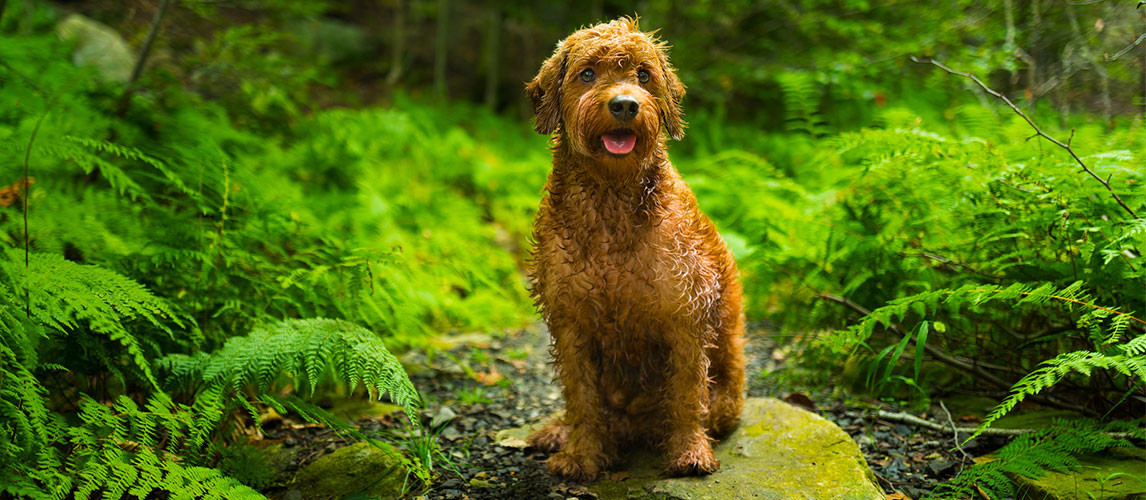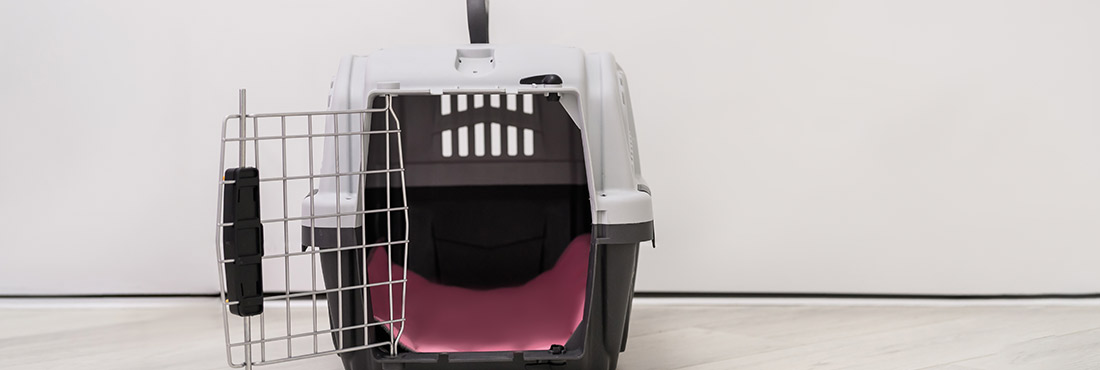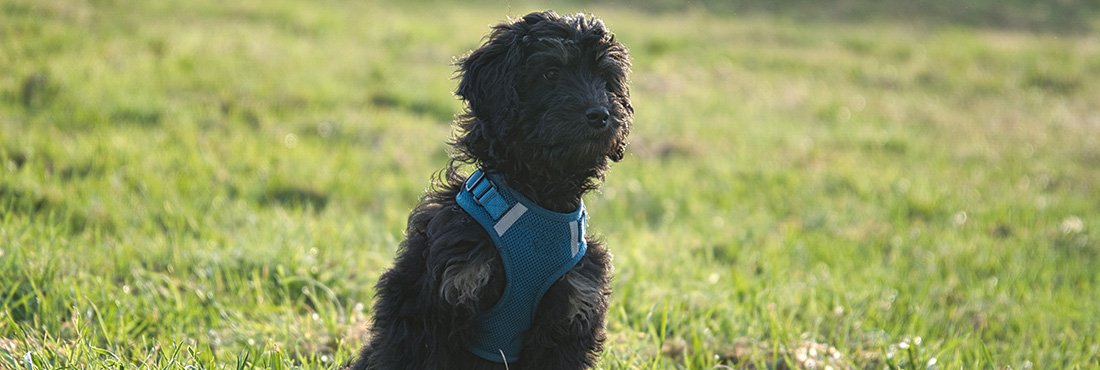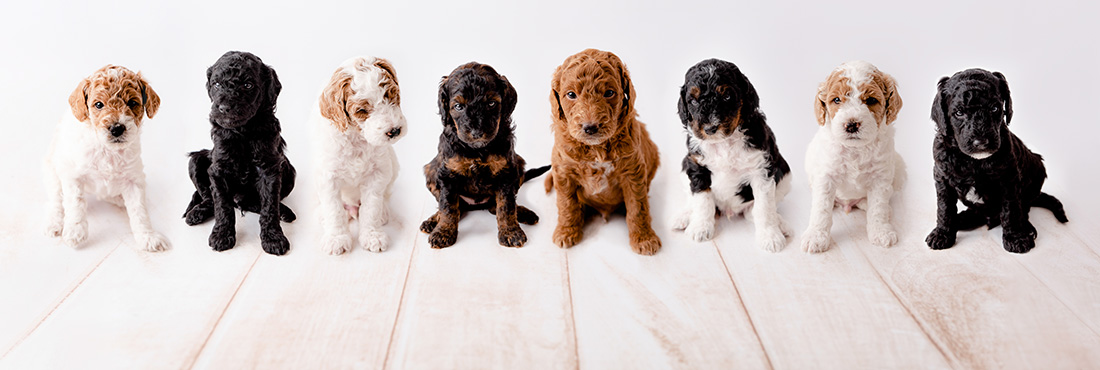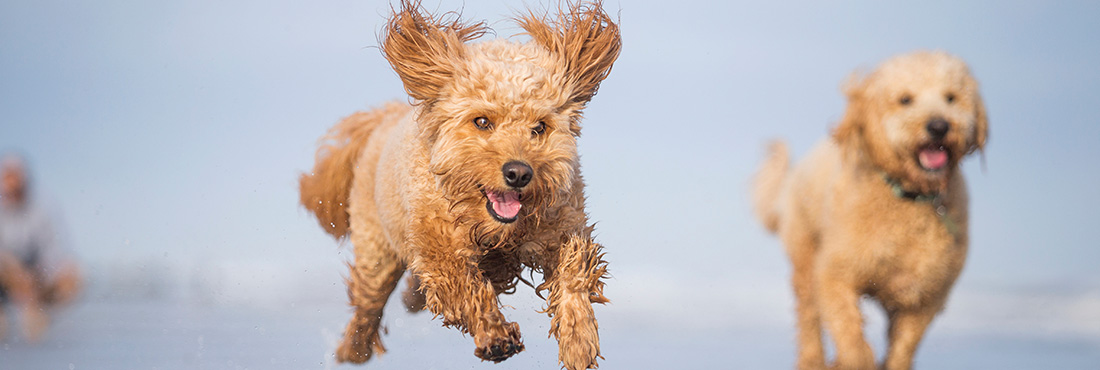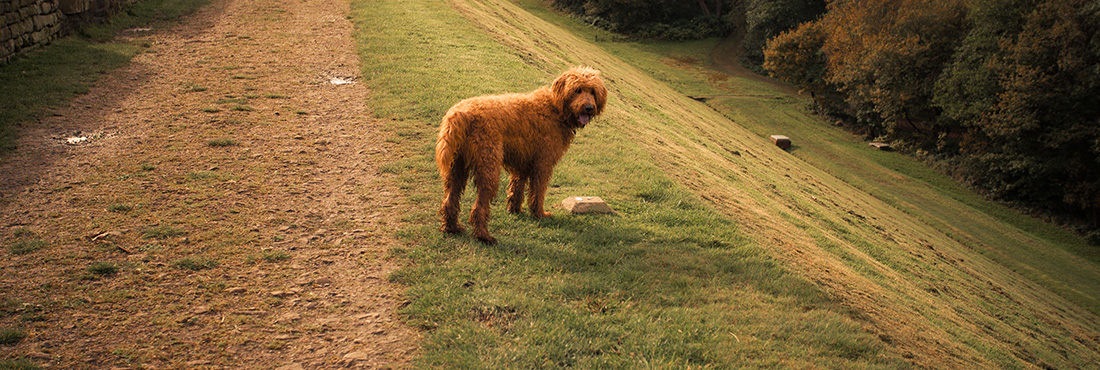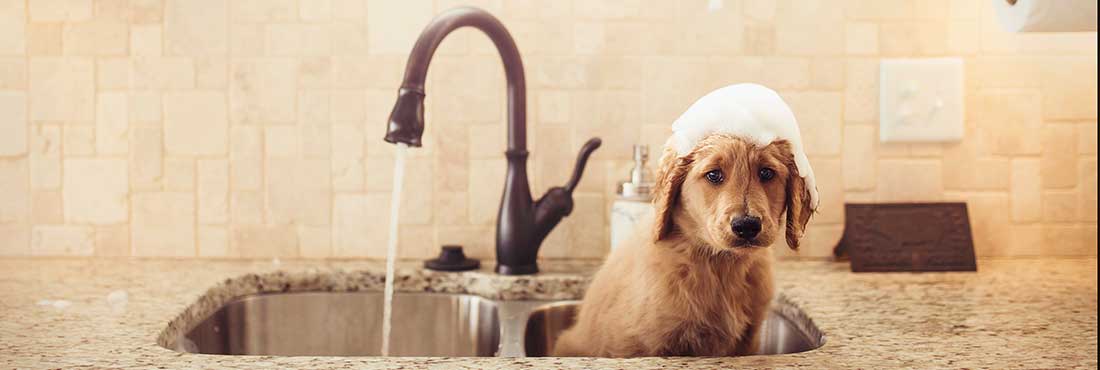Despite not being recognized by the American Kennel Club, the Goldendoodle is canine many dog lovers are familiar with. They are listed under the American Canine Hybrid Club, which officially identifies them as a mixed breed and one with a long list of lovable qualities.
What is a Goldendoodle?
Apricot Goldendoodles have the endearing qualities of two of the most popular dog breeds: the Golden Retriever and Poodle.
All dogs are different, but many Doodle owners and enthusiasts will argue that this beautiful offspring combines some of their parent breeds’ best qualities. Not only are they adorable, but they are also highly intelligent, affectionate, and suitably social.
Standard Apricot Goldendoodle Overview
| Height | Weight | Average Lifespan |
|---|---|---|
| 21-24 inches | 45-75 pounds | 10-15 years |
Note: The size of a Goldendoodle puppy will depend on its poodle parent as they can come in various sizes, including toy, miniature, and standard. The standard poodle is the most common size used for breeding Goldendoodle puppies.
What Makes a Goldendoodle Apricot?
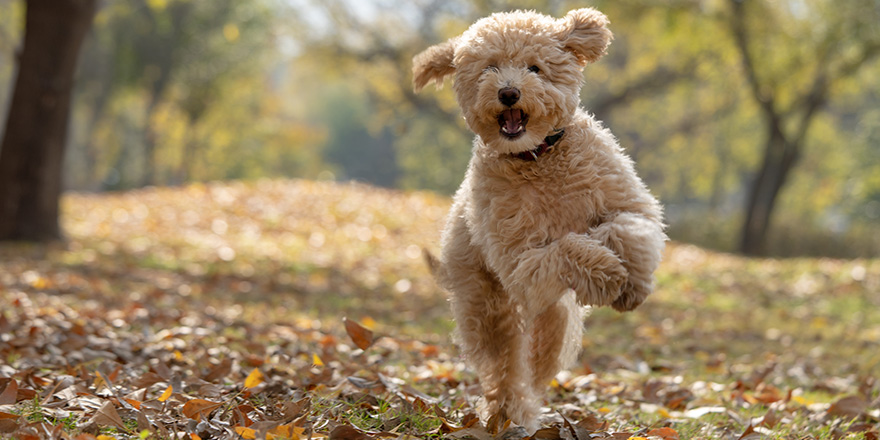
Goldendoodle colors can vary completely as they will be inherited from both breed parents. Golden Retrievers and Poodles can give us shades ranging from black, champagne, merle, red, tuxedo, and many more.
The Apricot Goldendoodle is perhaps one of the most recognized shades of Doodle. These dogs are described as being a lighter shade of red but aren’t to be confused with the red Goldendoodle. Although red Goldendoodles are very common among doodle lovers, they can be set apart from Apricots by their fiery red/mahogany coat color.
Goldendoodle Genetics
- F1 – First generation. Bred from a Poodle and Golden Retriever.
- F1b – First generation backcross. Commonly a Poodle is bred with another Goldendoodle.
- F2 – Second generation. Goldendoodle bred with another Goldendoodle.
- F2b – Second generation backcross. Goldendoodle (F1) bred to a Goldendoodle (F1b).
- F3 – Multi-generational breeding is used here, sometimes involving a purebred Poodle.
Apricot Goldendoodle Appearance
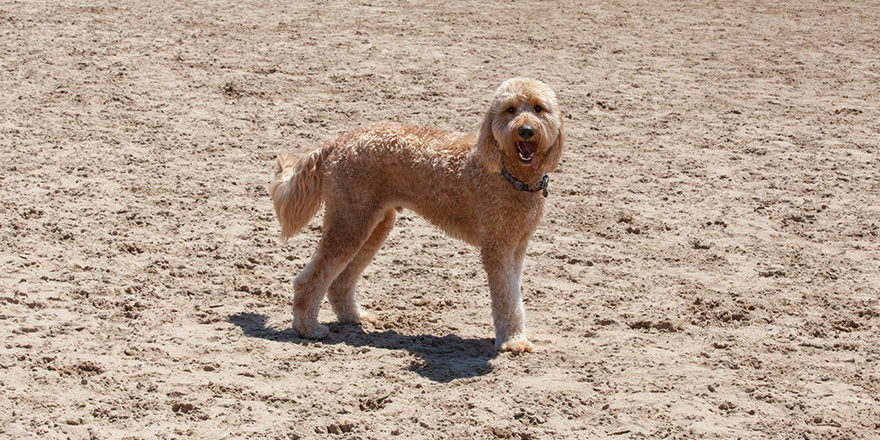
Goldendoodles are unique-looking dogs. They tend to have a beautiful wavy or curly coat and can come in various colors. You may be surprised to learn that they can also come in various sizes. Below is more in-depth information regarding their overall appearance, including size variations, coat colors, and even coat texture.
Height
As mentioned previously, the size of an Apricot Goldendoodle will depend on their Poodle Parents’ size. The Golden Retriever parent, of course, will be the typical size, but the Poodle parent used to breed can be toy, miniature, or standard. Ultimately, this will impact how big you expect your Apricot Goldendoodle to grow. Below are rough estimations of the sizes you can expect the Goldendoodle puppy to grow between.
| Toy | Miniature | Standard |
|---|---|---|
| 10-16 inches | 16-20 inches | 21-24 inches |
Weight
Like height, the weight will also depend on their Poodle parent. Generally, Goldendoodles will weigh anywhere between 15 to 80 pounds.
Coat Texture
Since there are different generations of Goldendoodles, you may find that the coat texture and style will vary depending on how close they are to the original Poodle genes. Typically, these coats will either be straight, wavy, or curly. Remember that the closer the Goldendoodle puppy is to their Poodle lineage, the curlier the coat.
Hypoallergenic Canines
Goldendoodles are a common choice for pet owners that struggle with allergies as they are considered low-shedding dogs. However, it’s important to note that all dogs shed, including the Goldendoodle.
Color Combinations
Believe it or not, the Apricot Goldendoodle has several color variations, which are listed below.
| Light Apricot Goldendoodle | Apricot Tuxedo Goldendoodle | Apricot Abstract Goldendoodle | Apricot and White Goldendoodle | Dark Apricot Goldendoodle |
|---|---|---|---|---|
| These Doodles will have a light apricot, almost cream-colored coat. From birth, they may appear quite vivid but will lighten over time. | Tuxedo Goldendoodles will display black and white pigmented front legs and sometimes stomachs. | Their Apricot coat will also have patches of white, taking up less than 50% of the overall coat color. | This can sometimes be considered an abstract Goldendoodle but is commonly referred to as a parti Goldendoodle depending on the white to apricot color ratio. | Simple put, this Apricot Goldendoodle's coat is a darker shade and will often be mistaken for a red Goldendoodle. |
These are just some of the common colors of an Apricot Goldendoodle, but they can also come in red and even a light shade of cream with an apricot hue.
Changes to Coat Color and Appearance
One thing to remember about Goldendoodles is that their coat will change over time. As puppies, Goldendoodles will have what is known as a ‘puppy coat’ before this inevitably sheds to make way for their adult coat. To add, the color may also change as time passes by. Generally, this means that your dog’s coat will become a lighter color the older they get. For bi-colored Goldendoodles, their markings will also fade or disappear altogether.
Apricot Goldendoodle Personality
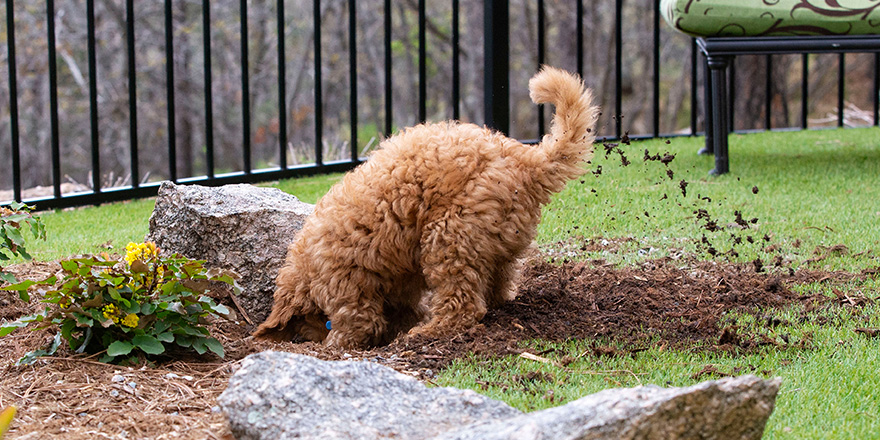
If you’re thinking about getting yourself one of these adorable, curly-coated pups, you’ll be pleased to know that many pet owners will vouch for their wonderful personality traits. Since both parent breeds are gentle and intelligent, you can expect their hybrid offspring to follow in their footsteps.
Intelligence
Golden Retrievers and Poodles are considered immensely smart dogs, and the Apricot Goldendoodle is not different. They are known to make extremely effective and versatile working canines, especially service or therapy dogs.
Furthermore, they enjoy participating in dog sports such as obedience and agility training. Not only do dog sports keep them fit and healthy, but it also keeps them mentally stimulated.
Energy Levels
Apricot Goldendoodles are regarded as having moderate to high energy levels. This means that they are active dogs that will require significant exercise and play sessions to burn off the energy. However, that doesn’t mean they require constant entertainment and tasks like other dog breeds. They will still enjoy curling up next to their favorite humans in the evening.
Sociability
Apricot Goldendoodles are loving animals that are incredibly friendly to those close to them and strangers. Compared to other breeds, the Goldendoodle doesn’t make a great guard dog and will sooner show a burglar their toys than intimidate them from stealing.
Children and Other Pets
Their love of people and their desire to play make great family pets. They will especially love playing fetch with children and mixing with other dogs or pets in the household.
Caring for an Apricot Goldendoodle
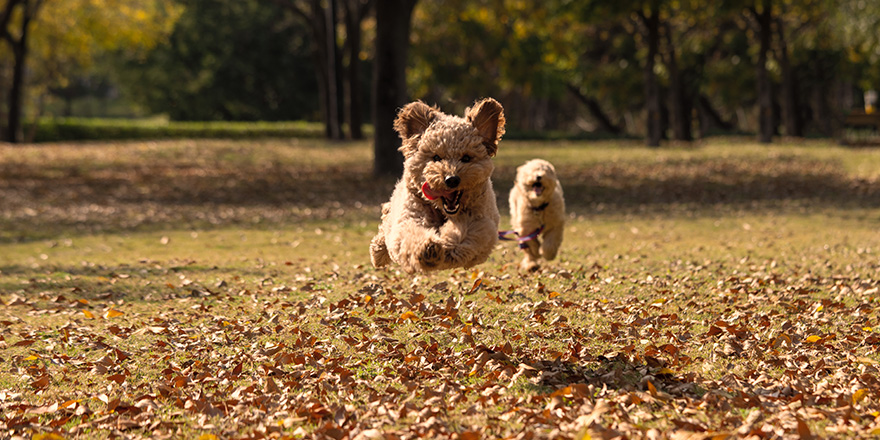
Diet
Like many other dog breeds, Apricot Goldendoodles rely on high-quality food to fuel and nourish them. Before getting one of these adorable dogs, do your research and consult a vet before getting ahold of their food.
In addition, it’s important to remember that their diet should be altered as they age to suit their energy levels and wavering nutritional needs.
Training
Like other canines, Apricot Goldendoodles should be socialized early to prevent them from developing anxiety or bad tendencies toward people and other animals. Due to their high intelligence, training will come easier to these canines not only because they are clever but also because they are known people pleasers.
That said, be sure you are prepared to train an Apricot Goldendoodle. Make sure you take a practical approach and use plenty of positive reinforcement, as a harsher approach may do more harm than good.
Exercise
Although Apricot Goldendoodles are active canines, they may not need as much exercise as you think. These pooches will require daily activity in the shape of a high-energy play session or a 30+ minute walk/jog.
*Note: It may also be interesting to learn that Goldendoodles are good swimmers and will enjoy a dip in a lake if given the opportunity.
Grooming
Whether they have a straight, curly, or wavy coat, your Apricot Goldendoodle will require regular grooming. Brushing your Doodle at least once a week is a must as this will prevent their coats from becoming tangled or matted. Brushing will also remove loose hair and help distribute natural oils that nourish and maintain the coat’s healthy appearance.
Moreover, ensure you take good care of their teeth and get their nails clipped when necessary. If you neglect these, you can invite a multitude of dental issues as well as problems relating to their gait and paws.
Potential Health Concerns
Sadly, Apricot Goldendoodles are prone to some health concerns. These can be avoided if you find your puppy from a reliable and trustworthy breeder. This is because they will screen their parent breeds and complete the necessary health checks to ensure pups are not likely to develop harmful issues.
Potential Health Problems:
- Hip dysplasia
- Progressive Retinal Atrophy (PRA)
- Patellar Luxation
- Glaucoma
- Sebaceous Adenitis
Finding an Apricot Goldendoodle Puppy
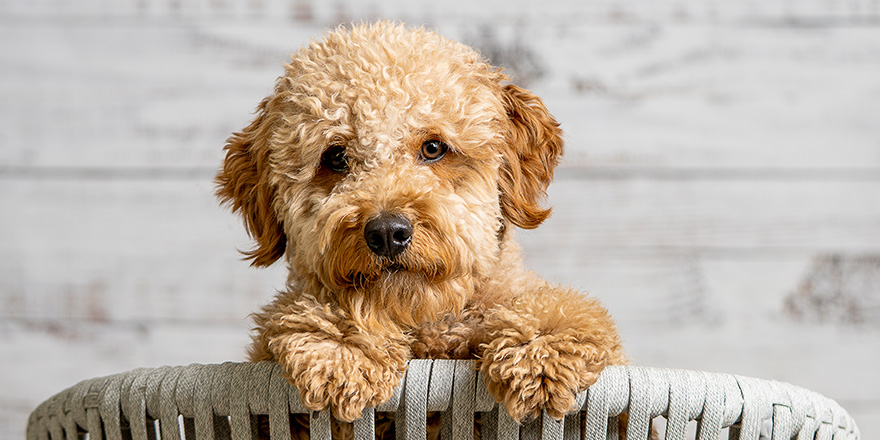
Apricot Goldendoodles are quite common, but you may have difficulty finding pups with particular coat types or shades of apricot. As mentioned above, Goldendoodles will shed their puppy coat to make way for an adult one. Therefore, you may have issues finding a specific type, such as a curly Apricot Goldendoodle.
That being said, most breeders will strive for a particular kind of Goldendoodle (including specific generations such as an Apricot F1 Goldendoodle) so make sure to ask plenty of questions. However, be sure to understand what to look for in dog breeders and be aware of any red flags.
Finding yourself any Apricot Goldendoodle for sale is simple if you know where to look. A thorough internet search will draw up some valuable information, but also take a look at the sites below:
Adopting
Adopting has many benefits. The primary is that you will give a pup the chance to love home. However, adopting may mean waiting a little while before you find your new best fur friend, but it’ll be worth it. Make sure you regularly check your local rescue centers and shelters.
Frequently Asked Questions
Compared to other colors of Goldendoodle, Apricot Goldendoodle puppies are quite common and are considered one of the most popular.
They will grow to be anywhere between 16 and 2o inches in height.
Yes. As Apricot Goldendoodle puppies age, their coat will inevitably become more pronounced. The color is also expected to fade into their senior years.
Red Goldendoodles and Apricot Goldendoodles are not the same dogs. The most significant difference is that a red Goldendoodle will have a vibrant coat color, whereas the Apricot Goldendoodle's color will be toned down.
No dog is completely hypoallergenic, but certain breeds are kinder to those with pet allergies. Since the Goldendoodle is considered low-shedding, they are much better suited for aspiring pet owners with allergies.


